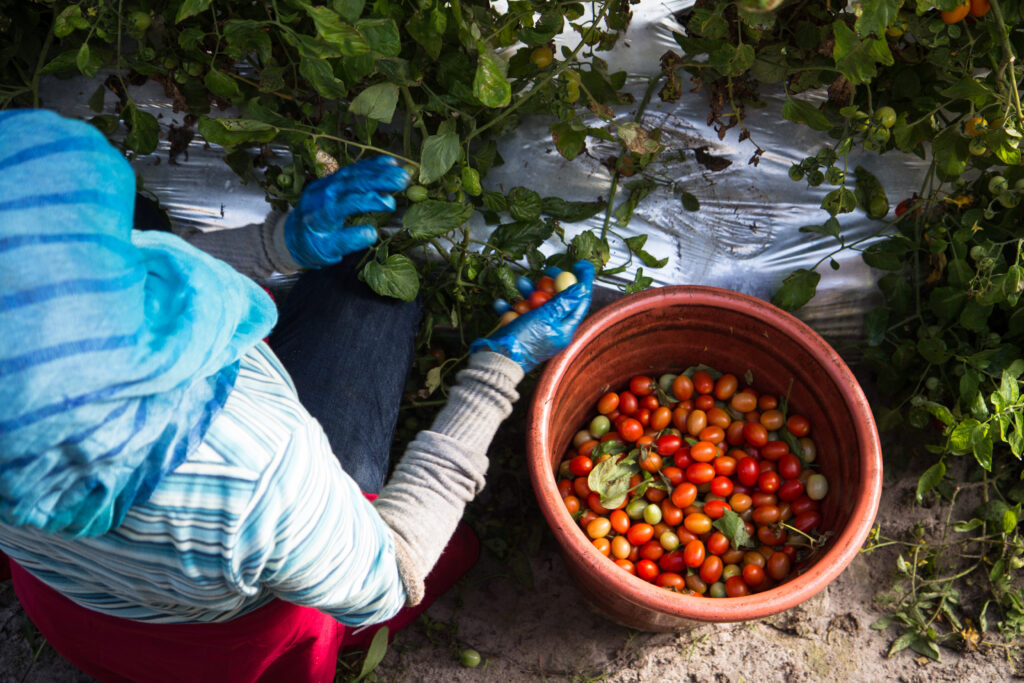
As it often does, this year’s national celebration of Labor Day prompted some excellent reporting on the many ways the Fair Food Program changes the lives of farmworkers across the U.S. agricultural industry — and how the FFP’s unparalleled success has become the source of inspiration for low-wage workers in other industries to take up the fight for their own fundamental human rights! Today, we’ve put together highlights from three such articles from national and local media that you won’t want to miss. There’s a lot to cover, so let’s jump right in!
The Hill: “Consumers can do good every time we step into a grocery store by buying Fair Food-certified produce and other products. And we can each do our part to push food companies to buy fruits and vegetables from certified farms that care about their labor force.”
On Labor Day, a powerful article penned by Sara Polon, CEO of the brand new Fair Food Program partner Soupergirl, hit the opinion pages of The Hill, one of the nation’s most-read political newspapers. The piece documents the deeply troubling reality of farmworkers outside the Fair Food Program today, and makes the case for consumers to encourage other CPG and retail brands to invest in partnering with the Fair Food Program because, as Sara so eloquently puts it, “There’s no virtue in buying pesticide-free produce grown on farms that abuse their workers for profit.”
This Labor Day, buy produce grown only on farms that respect workers’ rights
by SARA POLON, OPINION CONTRIBUTOR – 09/05/22
Forced labor, sexual assault and abuse are not normal dinner-table topics for the relaxing Labor Day weekend. But, sadly, this is often part of the story behind so much of the produce that winds up on our plates in America. As Justice Department prosecutors noted this spring when three defendants in Georgia were sentenced to federal prison for human trafficking on U.S. farms, “These men engaged in facilitating modern-day slavery.”
As the co-founder and CEO of a values-focused soup company, I have preached endlessly about the need to know the “story of our food.” And although we’ve made strides in drawing awareness to sustainability in the agricultural industry, we have not paid as much attention, perhaps, to the vulnerable and often unprotected laborers who do the actual work. […]
[…] We, the consumers, have the power to stop this and to reform the food supply chain for good.
One group, the Coalition of Immokalee Workers in Florida, is working to end abuse in the agricultural system. These farmworkers say they have seen it all: A farm manager reportedly beating a worker simply for stopping to take a sip of water. Undocumented workers hidden inside walk-in freezers to dodge immigration officials. Women who are raped in the fields and then too terrified to report the assaults for fear of losing their jobs, or worse.
The Immokalee Workers created the Fair Food Program, a unique partnership among farmers, farmworkers and food companies to ensure humane wages and working conditions for the people who help feed our families. Many retailers have signed on to participate, including Whole Foods, Walmart and Ahold. My company, Soupergirl, recently obtained a Fair Food certification just for our tomato gazpacho line. It’s a very modest step, and we hope that much bigger companies will join us. […]
[…] Consumers can do good every time we step into a grocery store by buying Fair Food-certified produce and other products. And we can each do our part to push food companies to buy fruits and vegetables from certified farms that care about their labor force.
There’s no virtue in buying pesticide-free produce grown on farms that abuse their workers for profit. This Labor Day weekend — and all days — let’s make sure that the food we put on our tables is worthy of the decent, hardworking people who picked it for us.
Prism Reports: “The power of the [Fair Food] program isn’t just that it creates a workplace monitoring program beyond anything that DOL is capable of doing, but also that it pushes corporations to assume responsibility for abuses against migrant farmworkers employed along their supply chains.”
In an excellent piece by Prism reporter Tina Vázquez, also published in honor of Labor Day, the Fair Food Program and Worker-driven Social Responsibility (WSR) are celebrated as one of the country’s most innovative organizing models for low-wage, immigrant workers seeking to increase poverty wages and eliminate generations of abuse.
It’s past time to celebrate migrant-led labor organizing
[…] Farmworkers fight back
Some of the most innovative labor organizing in the nation has been happening in the agricultural industry. The Coalition of Immokalee Workers (CIW), a worker-based human rights organization, pioneered the design and development of the worker-driven social responsibility (WSR) paradigm, a worker-led, market-enforced approach to the protection of human rights in corporate supply chains.
WSR takes shape in the form of the Fair Food Program, which ensures that migrant workers are directly involved in enforcing, monitoring, and designing workplace programs that provide protections through legally binding contracts among workers, tomato growers, and retail buyers that, if violated, can result in the program suspending growers and thus denying access to buyers. This can translate to the loss of millions of dollars in business. The Fair Food Program has successfully raised wages and improved workplace standards for thousands of farmworkers. The power of the program isn’t just that it creates a workplace monitoring program beyond anything that DOL is capable of doing, but also that it pushes corporations to assume responsibility for abuses against migrant farmworkers employed along their supply chains. Major corporations like McDonald’s, Whole Foods, and Walmart participate in the Fair Food Program.
Gerardo Reyes Chavez, a key leader in CIW who worked in the fields since the age of 11, said in an interview with Prism last year that changing the conditions of workers requires real commitments in the form of legally binding agreements—and consequences for corporations that don’t adhere to standards.
“There is a lot of conversation around social responsibility, but not a lot of change,” Reyes Chavez said. “Agriculture is a place where we see conditions of modern-day slavery. This program is something that is working very effectively, and by that, I mean it is changing the reality and the material conditions of workers.”
Magaly Licolli, an immigrant leader in the workers’ center movement since the 1970s, co-founded Venceremos, an organization rooted in the South that serves poultry workers and belongs to the Food Chain Workers Alliance, a coalition of over 30 worker-based organizations representing some 375,000 food workers across the U.S. and Canada. Venceremos adopted the WSR model pioneered by CIW that has since also expanded to Vermont’s dairy industry as part of Migrant Justice’s Milk with Dignity program. […]
Spotlight News Magazine: “The FFP came from the upwelling of people in the fields of a small farming community, and has developed into a template for workers’ rights of global stature.”
The Fair Food Program also garnered much praise last month in a special feature by local Southwest Florida Spotlight News Magazine. The whole article is a great read, but here’s a shortened excerpt:
Fair Food Program still working in the fields where it started
By ANN MARINA – 08/01/2022
Twenty years ago, Lupe Gonzalo came from Guatemala to Immokalee to pick tomatoes. Just outside of Naples in Collier County, she suffered inhumane living and working conditions for many years.
Along with her husband and 2-year-old son, Gonzalo shared a tiny trailer with several other people. “We couldn’t have air conditioning or heating because the landlord didn’t want high bills,” Gonzalo said. “Often it was like an oven and other times we froze.”
Renting the trailer cost $1,200 per month and workers were paid just 45 cents per bucket of tomatoes they picked. “How many buckets we could pick depended on the weather and crop size,” Gonzalo said. “Our only option was living crammed together.”
One day Gonzalo found a fellow worker who had passed out from heat stroke. He ended up being hospitalized. “We couldn’t revive him until someone put ice on him,” she said. “The bosses were supposed to provide drinking water but often they didn’t bring enough.”
For decades, many farmworkers have endured forced labor, sexual harassment, and violence. Last November some farm owners in Waycross, Georgia, were convicted on felony charges of international forced labor trafficking involving 71,000 farmworkers. One victim had died from heat stroke and another had been kidnapped and repeatedly raped.
“Those farms are not in the Fair Food Program,” Gonzalo said. “It ensures fair wages, affordable housing and humane working conditions.”
The Fair Food Program was developed in Florida in 2010 and has expanded into six other states.
Gonzalo learned about the program in 2011 through educators from the Coalition of Immokalee Workers. Right away she felt a calling to educate others and organize actions demanding workers’ rights.
Under the program, participating buyers pay a penny per pound more for their tomatoes and buy them only from participating farms. So far, 14 multi-billion-dollar food retailers, including McDonald’s, Subway, Walmart, and Whole Foods, have partnered with the Fair Food Program. […]
“The FFP came from the upwelling of people in the fields of a small farming community, and has developed into a template for workers’ rights of global stature,” said retired radiologist and science writer Jeanne Goldberg, M.D.
Goldberg sees the Fair Food Program as a win-win situation. “Evidence shows that plant-based foods are the key to a healthy diet, so demand for produce has risen,” she said. “Also, more people are now concerned about the welfare of workers who pick their food, so this program supports consumers’ interests too.”
Fair Food retail companies and farm owners also benefit. “It indicates they care about the workers picking the produce they sell,” Goldberg said.
That’s a wrap for today’s news round-up. Be sure to check back soon for more exciting news on the ever-expanding frontiers of Fair Food!


